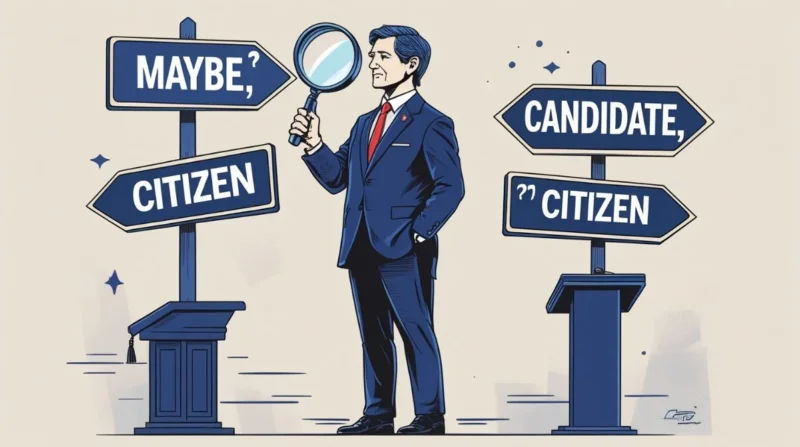Table of Contents
- What Exactly Is a Maydidate?
- Understanding the Term “Maydidate”
- The Journey from Citizen to Candidate
- Origins and Rise of the Term
- Characteristics of a Maydidate
- Why Use the Term “Maydidate?” Benefits and Drawbacks
- The Spectrum of Political Intent: From Citizen to Candidate
- Factors Influencing Movement Along the Spectrum
- Potential Origins and Rise of the Term “Maydidate”
- The Future of “Maydidate” in Political Discourse
- Conclusion
In recent years, the term “maydidate“ has started appearing in political discussions, social media, and even job search conversations. But what does it actually mean? Is it a typo, a joke, or a real concept? Let’s explore this new term and understand why it’s gaining attention in 2025.
What Exactly Is a Maydidate?
In today’s political landscape, the term “maydidate“ has emerged to describe individuals contemplating a run for public office but who haven’t officially declared their candidacy. This portmanteau of “maybe” and “candidate” captures the exploratory phase where potential candidates assess their viability, gauge public interest, and deliberate on the commitments required for a political campaign.
Understanding the Term “Maydidate”
A “maydidate” is a blend of the words “maybe” and “candidate.” It refers to someone who is considering running for a political office but hasn’t officially announced their candidacy. Think of it as a person in the exploratory phase, assessing whether to enter a race. They might attend events, meet with potential supporters, or test public interest, but they haven’t made a formal decision yet.
The Journey from Citizen to Candidate
To grasp where a maydidate fits, imagine a spectrum of political involvement:
- Citizen: An individual with no political ambitions.
- Maydidate: Someone exploring the possibility of running for office.
- Candidate: An individual who has officially declared their intention to run.
Maydidates occupy the middle ground, transitioning from private individuals to public figures.
Origins and Rise of the Term
The exact origin of “maydidate” is unclear. It likely emerged organically in online political forums or social media discussions. The internet’s ability to spread new words quickly has certainly helped its adoption.
Characteristics of a Maydidate
Maydidates often exhibit specific behaviors:
- Exploratory Actions: They might attend community events, engage with potential voters, or discuss issues publicly.
- Testing the Waters: Conducting informal polls or seeking feedback to gauge support.
- Non-committal Language: Using phrases like “considering a run” or “exploring options” without making definitive statements.
Why Use the Term “Maydidate?” Benefits and Drawbacks
In the ever-evolving world of politics, language plays a crucial role in shaping our understanding of emerging trends and behaviors. One such term that has recently entered the political lexicon is “maydidate.” This portmanteau of “maybe” and “candidate” refers to individuals who are contemplating a run for public office but have not yet officially declared their candidacy. While the term offers a succinct way to describe this exploratory phase, it’s essential to weigh its benefits and drawbacks to understand its place in modern political discourse.
Benefits of Using “Maydidate”
1. Clarity in Political Discourse
The term “maydidate” provides a clear label for individuals in the pre-candidacy phase. By distinguishing between declared candidates and those merely considering a run, it helps political analysts, journalists, and the public navigate the complexities of electoral landscapes.
2. Reflects Modern Political Realities
In today’s political environment, potential candidates often engage in activities like attending events, gauging public interest, and consulting advisors before making formal announcements. “Maydidate” aptly captures this intermediate stage, acknowledging the strategic considerations involved in launching a campaign.
3. Facilitates Media Coverage
For journalists and commentators, having a term like “maydidate” allows for more nuanced reporting. It enables the media to discuss individuals who are in the spotlight due to their potential candidacy without prematurely labeling them as official contenders.
4. Encourages Public Engagement
By identifying maydidates, the public becomes aware of emerging political figures and can engage in discussions about their potential platforms and qualifications. This early engagement can influence whether these individuals decide to run, fostering a more participatory democratic process.
Drawbacks of Using “Maydidate”
1. Lack of Formal Recognition
As a relatively new term, “maydidate” is not yet widely recognized or included in standard dictionaries. This lack of formal recognition can lead to confusion or misinterpretation, especially among audiences unfamiliar with the term.
2. Potential for Misuse
Without a standardized definition, there’s a risk that “maydidate” could be applied inconsistently. For instance, media outlets might label individuals as maydidates based on speculation rather than concrete actions, potentially leading to misinformation.
3. Oversimplification of Intentions
Labeling someone as a maydidate might oversimplify their intentions. Not all individuals exploring political opportunities have serious intentions to run; some might be testing the waters for other reasons, such as increasing their public profile or influencing policy discussions.
4. Adds to Political Jargon
Introducing new terms like “maydidate” contributes to the growing body of political jargon, which can be overwhelming for the general public. Excessive jargon may alienate individuals who feel disconnected from political discourse.
The Spectrum of Political Intent: From Citizen to Candidate
In democratic societies, political engagement exists on a spectrum, ranging from passive observation to active candidacy. Understanding this continuum helps illuminate how individuals transition from everyday citizens to political leaders.
1. The Apolitical Citizen
At one end of the spectrum lies the apolitical citizen—individuals who, for various reasons, choose not to engage in political processes. Factors such as disillusionment, lack of trust in institutions, or feeling that one’s voice doesn’t matter can contribute to political apathy. These citizens may abstain from voting, avoid political discussions, and remain disconnected from civic duties.
2. The Informed Observer
Moving along the spectrum, we encounter the informed observer. These individuals stay updated on political events, understand policy debates, and discuss political matters within their circles. While they may not actively participate in political activities, their awareness and discussions contribute to the broader political discourse.
3. The Active Participant
Active participants engage directly in political processes. They vote in elections, attend town hall meetings, join political rallies, or volunteer for campaigns. Their involvement signifies a commitment to influencing political outcomes and supporting causes they believe in.
4. The Advocate or Activist
Advocates and activists take participation a step further by organizing events, leading movements, or working with organizations to push for policy changes. Their efforts often aim to address systemic issues, represent marginalized communities, or promote specific legislative agendas.
5. The Maydidate
A term blending “maybe” and “candidate,” a maydidate is someone contemplating a run for public office but hasn’t officially declared their candidacy. They might assess public support, consult with advisors, and evaluate the feasibility of a campaign. This exploratory phase allows individuals to gauge their readiness and the potential impact of their candidacy.
6. The Declared Candidate
At the far end of the spectrum is the declared candidate—someone who has officially entered the race for public office. This stage involves formal campaign activities, policy articulation, public debates, and efforts to secure votes. Declared candidates commit to the responsibilities and scrutiny that come with seeking elected positions.
Factors Influencing Movement Along the Spectrum
Several elements can motivate individuals to move along this spectrum:
- Personal Experiences: Life events or injustices can spur political engagement.
- Community Needs: Observing unmet needs or issues within one’s community can drive activism or candidacy.
- Mentorship and Encouragement: Support from peers, mentors, or organizations can inspire deeper political involvement.
- Access to Resources: Time, finances, and knowledge can either facilitate or hinder political participation.
Potential Origins and Rise of the Term “Maydidate”
In the evolving landscape of political language, new terms often emerge to capture nuanced concepts. One such term gaining traction is “maydidate.” This portmanteau of “maybe” and “candidate” describes individuals contemplating a run for public office without having officially declared their candidacy. Understanding the origins and rise of “maydidate” offers insight into modern political discourse.
Linguistic Roots and Formation
The term “maydidate” is a blend of “maybe” and “candidate,” reflecting its meaning as someone who is considering, but has not yet committed to, running for office. This formation aligns with other political neologisms like “gerrymander,” which combines a name and a descriptor to convey a specific concept. Such linguistic creativity allows for concise expression of complex ideas.
Emergence in Digital Spaces
While pinpointing the exact origin of “maydidate” is challenging, it’s believed to have surfaced organically within online political forums and social media discussions. The internet’s capacity to rapidly disseminate new terms has undoubtedly contributed to its spread. As political conversations increasingly occur online, terms like “maydidate” gain visibility and usage.
Adoption in Political Discourse
The term has found a place in political commentary, particularly in discussions about individuals who are testing the waters before launching a campaign. By providing a label for this exploratory phase, “maydidate” facilitates clearer communication about a potential candidate’s intentions and actions.
Broader Cultural Impact
Beyond politics, “maydidate” has been adopted in other contexts to describe individuals considering significant commitments, such as job changes or public endeavors. This broader usage underscores the term’s versatility and the public’s appetite for language that captures transitional states.
The Future of “Maydidate” in Political Discourse
In the evolving landscape of political communication, the term “maydidate“ a blend of “maybe” and “candidate”—has emerged to describe individuals contemplating a run for public office without having officially declared their candidacy. As political strategies and media interactions become more nuanced, understanding the trajectory and potential permanence of this term offers insight into modern political discourse.
The Emergence of “Maydidate”
The term “maydidate” has gained traction as a descriptor for those in the exploratory phase of political candidacy. This stage allows individuals to assess public interest, build support networks, and refine their messaging before committing to a formal campaign. The strategic advantages of this phase include the ability to gauge voter sentiment and avoid early scrutiny Gramhir Pro.
Social Media’s Role in Amplifying the Term
Social media platforms have played a significant role in popularizing “maydidate.” Potential candidates often use these platforms to hint at possible runs, engage with constituents, and measure reactions without making official announcements. This digital engagement allows maydidates to build a following and test campaign messages in real-time.
Public and Media Perception
The ambiguity surrounding maydidates can lead to varied public and media reactions. Some view the maydidate phase as a savvy move, allowing for strategic planning and momentum building. Others perceive it as indecisiveness or political posturing. Nevertheless, media coverage often intensifies during this phase, analyzing potential candidates’ every move and speculating on their intentions.
Cultural Relevance Beyond Politics
Beyond its political application, “maydidate” has found a place in broader cultural conversations. It’s sometimes used humorously to describe individuals who are non-committal in various life decisions, from job changes to personal relationships. This broader usage underscores the term’s resonance with contemporary themes of contemplation and decision-making.
The Term’s Future in Political Discourse
The continued use and acceptance of “maydidate” in political discourse will depend on its utility in accurately describing the exploratory phase of candidacy. As political campaigns become more complex and media-driven, having terminology that encapsulates these nuanced stages becomes increasingly valuable. If “maydidate” continues to fill this linguistic gap effectively, it’s likely to remain a fixture in political vernacular.
Conclusion
The term “maydidate” encapsulates a unique phase in the political journey—where individuals are contemplating a run for office but have yet to make an official declaration. This period is marked by exploratory actions, gauging public interest, and assessing the feasibility of a potential campaign. Understanding the role of a maydidate offers insight into the early stages of political candidacy and the strategic considerations involved. As political landscapes evolve, recognizing and analyzing the behaviors of maydidates can provide valuable perspectives on emerging leadership and electoral dynamics.









